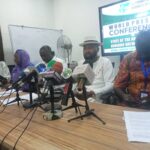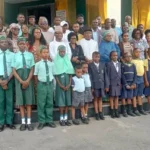Stakeholders reaffirm commitment to combat land degradation for rural communities
By Abigael Joshua
Stakeholders in Abuja on Tuesday renewed their commitment to address the pervasive issue of land degradation affecting 19 northern states and the Federal Capital Territory.
Mr Mahmud Kambari, the Permanent Secretary of the Federal Ministry of Environment, made this declaration during a training programme focused on Land Restoration Techniques.
Collaborating with the Food and Agriculture Organisation (FAO) of the United Nations, the training was conducted in partnership with the Agro-Climate Resilience in Semi-Arid Landscapes (ACReSAL) project, funded by the World Bank, the News Agency of Nigeria (NAN) reports.
Kambari highlighted the significance of the ACReSAL project as a pivotal initiative toward environmental conservation and sustainability.
He emphasised that land restoration is a shared responsibility among stakeholders, crucial for sustaining ecosystems, fostering biodiversity, and mitigating climate change for the well-being of communities.
Dr Ibrahim Goni, Conservator-General of the National Park Service, expressed the park’s continued advocacy for effective protection of the seven parks to counter challenges posed by climate change.
Goni acknowledged the benefits derived from ACReSAL projects, particularly in solar power installation, which has streamlined their operations.
He appealed for increased engagement from ACReSAL projects to further enhance the country’s biodiversity.
 Dr Moctar Sacande, Land Technical Officer of the FAO project, underlined that the training aimed at ensuring the successful implementation of the ACReSAL project.
Dr Moctar Sacande, Land Technical Officer of the FAO project, underlined that the training aimed at ensuring the successful implementation of the ACReSAL project.
Sacande commended ACReSAL for project implementation and the World Bank for financial facilitation.
The training was organised specifically for the 19 northern states.
Mr Abdulhamid Umar, National Project Coordinator for ACReSAL, stressed the need for serious drive and capacity building in landscape restoration.
He described the training as equipping selected colleagues from states and community levels with the necessary skills to transfer knowledge from Abuja to local communities.
Representing the World Bank, Mr Andrews Seglah hailed the ACReSAL project as a significant step toward achieving sustainable landscape restoration and a cleaner environment.
He assured continued support from the World Bank and encouraged participant states to disseminate knowledge regionally, especially at the grassroots level, for environmental sustainability. (NAN) (www.nannews.ng)
Edited by Razak Owolabi
Published By
- Agriculture and Environment Desk Controller/Website Content Manager.
Has also recently published
 General NewsJuly 5, 2025Natasha’s reinstatement: NCSCN condemns call for protest, urges restraint
General NewsJuly 5, 2025Natasha’s reinstatement: NCSCN condemns call for protest, urges restraint EnvironmentJuly 4, 2025Group empowers young Nigerians for climate advocacy
EnvironmentJuly 4, 2025Group empowers young Nigerians for climate advocacy Economy/BusinessJuly 4, 2025Rebranding initiative to boost development, transparency – BPP
Economy/BusinessJuly 4, 2025Rebranding initiative to boost development, transparency – BPP General NewsJuly 4, 2025VON targets 500m Swahili listeners through partnership with Tanzania
General NewsJuly 4, 2025VON targets 500m Swahili listeners through partnership with Tanzania





